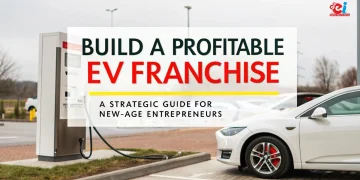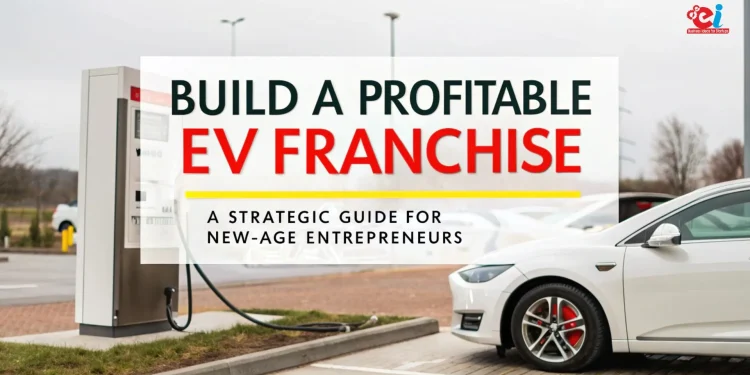Electric vehicles (EVs) are not only changing the way we commute, but they’re also transforming entire industries. Entering the EV space to build a profitable, future-ready company is no longer high-risk and high-barrier. This is an opportunity for entrepreneurs, especially if they use the franchising model.
Reliable and widespread charging infrastructure is the backbone of India’s EV transition, fueled by government policies, rising fuel costs, and consumer demands. Launching an EV Station franchise is a great way to create recurring revenue streams and lower capital expenditure.
This article explains how to build a profitable EV Station Franchise step-by-step. This article offers a complete guide for those who are ready to jump into India’s most exciting story of energy transition. It covers everything from market potential, infrastructure planning and operational execution to long-term monetization.
Why EV Station Franchise is the Next Big Business Frontier
India is at an important point in its journey towards clean energy. Electric vehicle sales have already exceeded 1.5 million units per year, and major OEMs are committed to 100% electrification. The need for charging infrastructure has become urgent and massive. It’s estimated that by 2030 that India will need over fifty lakh public and semipublic chargers to support its vehicle base.
In this environment, EV Franchise Stations are the missing link, connecting vehicles, electricity grids, and government mandates with everyday users. These stations are more than just service points. They’re also strategic infrastructure nodes.
Entrepreneurs are attracted to:
- Low-tech risk with franchise partner support
- Recurring revenue based on energy consumption and service fees
- Government-backed Demand
- First mover advantage for Tier 2 and Tier 3-city cities
Related: How to Start an EV Station Franchise
Market Growth: EV Charger Infrastructure in Numbers
India’s electric vehicle infrastructure is growing at an unprecedented rate. According to research conducted by NPCS, industry groups, and NPCS, the number of public charging stations will grow from 7,000 by 2022 to more than 100,000 by 2025, and perhaps 500,000 in 2030.
It is estimated that the total market for EV charging equipment will exceed Rs 55,000 crores by 2025, with a CAGR exceeding 36%. This segment represents one of the fastest-growing segments of the green economy.
This growth is driven primarily by:
- State EV policies and central schemes such as FAME-II
- Electric logistics fleets are on the rise (e-commerce and cab aggregators).
- Tata Motors and Mahindra are among the brands that have been pushing OEMs.
- Shared EVs, e-bikes, and other urban mobility solutions are available.
This is not just a passing trend, but a structural shift. Franchisees can take advantage of a 10-year growth window by entering now.

Profitability is built on the foundation of choosing the right franchise partner
The right franchise brand is essential to success in this industry. An EV franchise, unlike a fuel station or service center, must provide support for software, operations, and technical issues in order to guarantee uptime, customer satisfaction, and revenue tracking.
Franchise networks in India are being actively expanded by renowned players such as Tata Power, EZ Charge, ChargeZone Statiq and Ionage. Each has its advantages, business models and installation requirements.
When choosing a partner:
- Compatibility of chargers (AC/DC mix), and maturity of technology
- Software platform for billing and booking.
- Commission structure or revenue-sharing
- Marketing and on-the-ground support
- Franchise fees, equipment ownership and branding
Your partner choice directly impacts your capital structure, operating model and ability to scale.
Related: The Rise of Electric Vehicles: Government Policies Fuelling the Change
Strategic Location: Plug Profit Where it is Plugged in
Location is key to EV infrastructure. Your EV franchise’s profitability is heavily dependent on the site you choose. High-traffic areas, fleet-intensive zones, and urban hotspots usually yield higher returns.
The following are ideal locations:
- Apartment complexes that have EV-owning tenants
- Toll zones and rest areas on highways
- Shopping malls and metro stations, corporate IT parks
- The hubs of bus depots and eRickshaws
- Parking lots in urban areas near markets
A feasibility study should consider grid proximity and other factors such as transformer availability, traffic patterns for vehicles, and accessibility. Some partners provide tech-enabled sites that are based on these metrics.
The location can also affect the type of chargers you install. For example, slow AC chargers are best for offices and residential areas. Fast or ultra-fast DC charging stations should be installed for highways or commercial transport hubs.
How to Set Up Your EV Charge Station?
While franchisees do not manufacture the hardware, they need to understand how it is installed in order to effectively manage site deadlines and regulatory approvals.
The process of setting up a new computer includes:
- Site Survey & Power Load Assessment
The experts assess the site’s grid connection, determine if new transformers are required, or LT lines need to be upgraded, and decide the best location for the charger. - Civil Foundation work
Concrete pads are laid out for charger installation along with fencing and ramps. Signage, drainage, and signage may also be required. - Installation of Chargers and Cabling
The AC or DC chargers will be mounted, connected to grid via cables and switchgear and then tested for voltage stability and load stability. - Integration of Software and Apps
This system syncs with the software platform of the partner for payments, monitoring and customer interaction. - Safety and Fire Compliance
Before opening to the public, all systems are tested and installed.
From the time of franchise registration to the commercial launch, it usually takes between 30 and 60 days.
Charges as Income: Monetization Models
Entrepreneurs who want to build a profitable EV business must be familiar with the available business models and match them up with the location’s traffic potential as well as the user segment.
Pay-per-use is the most popular model, in which EV owners are charged based on how many kWh they consume. Fast chargers enable you to serve more clients in less time. This increases your revenue per day. Residents in residential areas are likely to be slower and more frequent users.
Subscription-based models are popular in corporate and institutional areas. The companies pay a monthly fee to access dedicated chargers. In logistics-heavy areas, Charging-as-a-Service (CaaS) can be offered to e-commerce or delivery firms needing scheduled charging windows.
Digital billboards and brand activations can be used at stations with high footfall to increase revenue. Franchisees can increase margins by bundling additional services such as food counters and tyre-inflators.
Profitability increases by:
- Electricity tariffs are low (many states offer EV-specific low tariffs).
- Charge up time is > 95%
- The user experience is seamless.
Building customer traffic and ensuring station utilization
The best location and equipment won’t bring in profits unless your users can easily access and find you. branding and partnerships, as well as digital visibility, are important.
You should list your franchise on:
- Google Maps (EV Charging Stations category)
- App for the partner
- EV routing applications like PlugShare, ReCharg,e and EV Plugs
Customers can be attracted in the early months by offering promotions such as free first charges or loyalty points. Partnering with nearby EV dealers, fleet operators or society management committees will bring in institutional traffic.
The following is also included in a high-performance EV station:
- 24×7 availability
- Bookings in real-time
- Customer Support and Helpdesk
- Safety signage and branding that is visible
Word-of-mouth and a good service will encourage repeat traffic as adoption increases.
Compliance with Regulations and Incentives – Know the Rules to reap the benefits
Indian government provides support for EV infrastructure via a combination of state and central schemes. The FAME II scheme offers subsidies for hardware and installation. Moreover, some states, such as Delhi, Maharashtra and Tamil Nadu, offer tariff advantages and assistance with land lease.
The EV charging industry is classified as an unlicensed activity. This means that franchisees do not need an electricity distribution license. They must comply with BIS standards and use chargers that are IS certified.
Compliant behavior not only helps you avoid penalties, but it can also lead to tax rebates and grants.
Scaling up: From a single station to a multi-location network
Scaling becomes easier once your first station is profitable. Franchise agreements include rights to multiple locations or regional expansion. With centralized SOPs and app management, you can manage multiple sites with limited staff.
You can use the data from your current site (peak hours, vehicle types, power usage) to intelligently plan your next location. Clustering stations along high-density corridors will ensure greater asset utilization as well as a stronger brand presence.
Entrepreneurs who have a real estate or logistics background can integrate EV charging in existing infrastructure such as parking, delivery or warehouses.
For more information check out this video
How NPCS Can Help You Scale Your Business Confidently and Smartly
It takes more than just enthusiasm to launch a profitable EV business. It requires strategic insight, technical clarity, and feasibility assessment. Niir Project Consultancy Service (NPCS can help.
NPCS provides Market Study cum Detailed Techno-Economic Feasibility Reports to help you better understand the market dynamics, competitive landscape, and viability. They cover the entire process, from charger types and raw materials to plant design and technical specifications.
Whether you are evaluating the feasibility of establishing new infrastructure and industries or expanding to multiple cities, NPCS can help entrepreneurs with confidence.
Find Best Idea for Yourself With our Startup Selector Tool
Conclusion: Now is the time to plug in
India’s biggest mobility shift has been the EV switchover since the liberalization in the auto industry. Infrastructure players, especially franchisees, are at the heart of this movement. Building a profitable electric vehicle franchise with the growing demand, government support and evolving technology is not just a smart business idea, it’s also a future-proof one.
You can now plug in and power up to benefit from India’s future electric economy, whether you are a manufacturing advisor, real estate developer or service business owner.


















